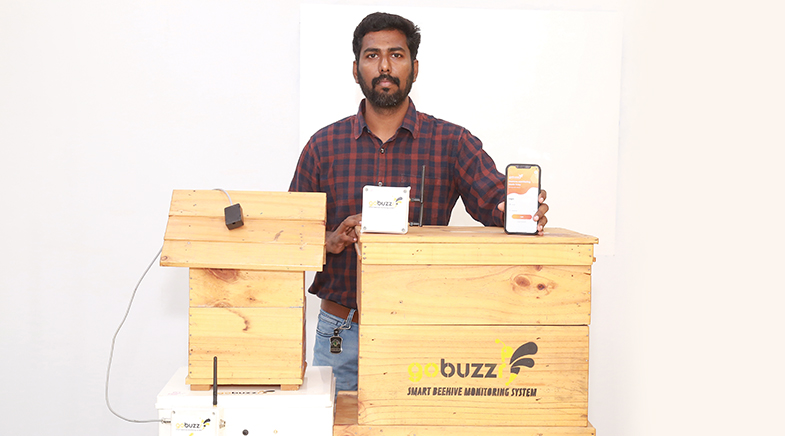Gait, set, go
-
- from Shaastra :: vol 04 issue 03 :: Apr 2025

Innovators focus on nasal walls, batteries and health.
INCIPIENT MATERIALS
Founders: Ashwini Kumar Agrawal and Anju Agrawal
Year: 2021
Big idea: Materials based on textiles for medical applications
A pair of smart socks that can detect and measure a person's walking pattern, and thereby the state of their health? That's not science fiction, but a product devised by Delhi-based Incipient Materials. The start-up was launched in 2021 by Ashwini Kumar Agrawal, who is on the faculty in the Department of Textile and Fibre Engineering at the Indian Institute of Technology (IIT) Delhi, and wife Anju, a chartered accountant.
"We have been developing various deep technologies in the healthcare space," says Agrawal, who graduated in Textile Engineering from IIT Delhi and earned a PhD in Chemical Engineering from the University of Rochester, New York. He is the coordinator of SMITA (Smart Materials and Innovative Textile Applications) Research Lab at IIT Delhi. The start-up uses the research done at the lab to fashion new materials based on textiles for diverse applications.
Agrawal adds that among the products the start-up is developing are socks that automatically record a person's walking pattern, also called gait pattern. This gait is used to analyse what ailment the wearer may have. A person's gait changes with an orthopaedic or neurological problem. The socks look at different aspects of the gait — the pressure put on the foot, which part of the foot the pressure is on, the time taken for a step, variations in time between the right and left footsteps, and so on. For someone with an ailment, there may be significant differences in footsteps. "These socks monitor how a person's foot touches the floor as they record the four major pressure points on the foot," he says.
These smart socks have textile-based sensors — and can capture almost 80% of the data that a gait machine records.
Usually, a person's gait pattern is recorded in a gait analysis machine, which is expensive and rare in India. These smart socks have textile-based sensors, can stretch and be washed — and capture almost 80% of the data a gait machine records. The sensor has a small module that transmits the data to a tablet or mobile phone. This module can be removed when the socks are washed. The company is trying to validate the data collected by the socks with the gait lab at the All India Institute of Medical Sciences, Delhi.
Another of its prospective products is a synthetic surgical simulator made of polymers and textile composites that closely mimics the properties of a tissue. Yet another product is for corneal grafts. The start-up has developed a synthetic membrane in place of an amniotic membrane. The amniotic membrane is preserved and then used on patients. The membrane has to be preserved at extremely low temperatures, and transporting it is expensive. The company will carry out trials and get approvals before launching the product.
CALDOR HEALTH TECHNOLOGIES
Founders: Thilak Chakaravarthi and Harisharan Ramesh
Year: 2022
Big idea: Developing a minimally invasive procedure to deal with a deviated septum

When Harisharan Ramesh joined a Master's programme in Medical Technologies, he wondered if he could look at a non-invasive method to deal with a deviated septum — a nasal wall problem he suffered from. As it happened, his project proposal for the joint programme at the Indian Institute of Technology (IIT) Jodhpur – All India Institute of Medical Sciences (AIIMS) was vetted by Thilak Chakaravarthi, his senior at the institute as well as at the PSG College of Technology, Coimbatore, where Harisharan had studied biotechnology and Thilak had done a B.Tech in Metallurgical Engineering.
They decided against using electro-mechanical technology as it required passing heat-generating direct current to reshape the nasal cartilage. Harisharan says they opted for radio frequency (RF) waves, which generate only a small amount of heat. Their idea, he says, is to provide minimally invasive techniques to help doctors rectify nasal conditions such as a deviated septum. A deviated septum (nasal wall) makes a nasal passage smaller than the other.
In 2022, they set up Caldor Health Technologies in Coimbatore, Tamil Nadu, and developed a device consisting of a wand and an RF-generating module. Surgeons would apply local anaesthesia to a patient, and with the wand, which would have electrodes, reshape the septum. Thilak says the entire procedure would take up to 45 minutes, unlike traditional surgery, which may entail a hospital stay. The start-up has filed for three patents for the device and the technology.
They validated their technology through ENT surgeons in Jodhpur and Coimbatore after experimenting on goat nasal septa to see how the cartilage would get reshaped and whether it retained the new shape after the procedure. A few grants enabled them to complete these experiments.
"We have finalised the consumables, figured out how the wand will look and what material we will use. The consumables are in the final stages of design," says Thilak. He adds that the RF waves will be generated by commercially available machines.
Caldor will now have to conduct human trials to determine if the patients recover completely and quickly and whether doctors would see their product as superior to surgery. After that, they will launch the product. Doctors have not validated the clinical efficacy of the procedure as human trials have not been conducted. But the histopathology of the treated septum and other assays such as the mechanical and molecular properties of the treated cartilage were assessed and the results proved the safety and efficacy in ex vivo tissues, the start-up founders say.
DREAMFLY INNOVATIONS
Founders: Kajal Shah and Saurabh Markandeya
Year: 2022
Big idea: To build high-power batteries for drones and aerospace applications
PHOTO: BY SPECIAL ARRANGEMENT

The founders of Dreamfly Innovations, Kajal Shah (right) and Saurabh Markandeya.
Observing that drones were in wide use across sectors, Kajal Shah and Saurabh Markandeya discussed the application of crewless aerial vehicles with industry pioneers back in 2020. The two, who had previously started a venture in electric hybrid transmission, learnt of the drone sector's pain points: companies faced numerous issues with the batteries, which often got overheated and caught fire. The batteries were mostly imported and customised for India.
Shah and Markandeya, confident they could build a venture at the intersection of aviation and batteries, founded Dreamfly Innovations in January 2022. The two had earlier worked in Tata Motors. Shah had done her Master's at the Indian Institute of Technology (IIT) Bombay after graduating in Mechanical Engineering from the National Institute of Technology Raipur. Markandeya had done his Bachelor's in Mechanical Engineering from COEP (College of Engineering Pune) Technological University, and a doctorate from the Indian Institute of Science in Mechanical Engineering (Advanced Powertrains). They understood the electric mobility sector and realised there was a global shift to electrification.
Dreamfly Innovations was established to develop a battery that would help in electrification. The battery had to be robust, use sustainable materials, and not have the problems the existing lithium-ion batteries faced — overheating and catching fire. The company designs and manufactures customised batteries for drones. It started with four clients who had complaints about the batteries they were using. The duo started solving problems such as battery fire and poor performance; the earnings from these sustained them through the first year. In December 2024, they raised their first institutional round of funding. Now, they are working with drone customers in sectors such as agriculture, terrain mapping, and surveillance.
The battery had to be robust, use sustainable materials, and not have the problems the existing lithium-ion batteries faced.
The company offers sustainable battery solutions. "We identified graphene-based technology as one that had maximum sustainable capability at source and minimal recycling impact," says Markandeya. Unlike lithium-ion batteries, which had mining and recycling issues, graphene batteries did not harm the environment. Graphene-based batteries, however, are 50-60% more expensive than lithium-ion batteries. He adds that the company works with different cell chemistries and a range of technologies that improves battery functioning.
Dreamfly produces high-power density batteries for drones, electric planes, aerospace, defence and robotics. It manufactures the batteries in-house at a temporary facility, procuring cell technologies from companies abroad. The start-up has filed a patent for a material it has developed for a battery case, which reduces operating temperatures by up to 20°Celsius and significantly lowers fire risks. It can be used in drones that are operated under extreme cold conditions and is being used for field trials in the Himalayas. A lightweight cell stack design improves efficiency and reduces weight, Markandeya says.
Have a
story idea?
Tell us.
Do you have a recent research paper or an idea for a science/technology-themed article that you'd like to tell us about?
GET IN TOUCH














